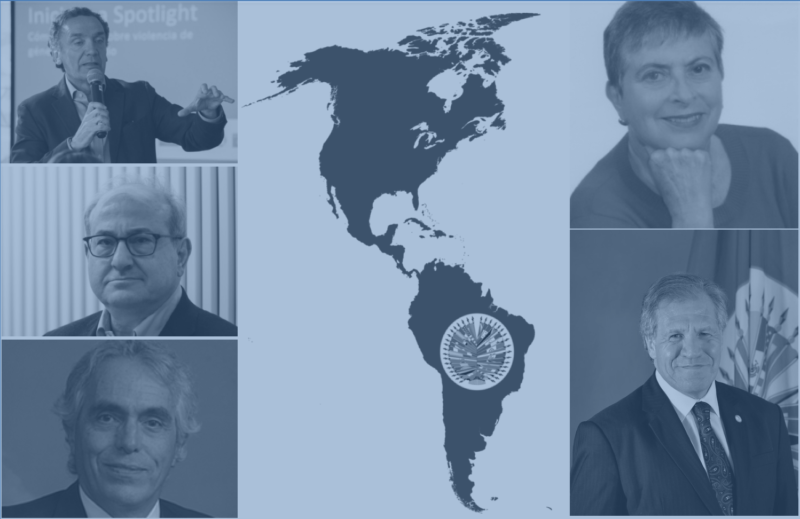Can Spain Solve the Cuba Problem?
By all accounts, Spain wants to bring change to the European Union’s Cuba policy. In so doing, it is tackling a foreign policy challenge that often sheds more heat than light.
This post is also available in: Español
On September 9, 2021, the Inter-American Dialogue hosted the virtual event “20 Years of the Democratic Charter in the Americas.” The panel discussed the current state of the Democratic Charter 20 years after its signature. Panelists discussed the corrosion of the rule of law in the region and the challenges the Charter faces in light of this deterioration. Michael Shifter, president of the Inter-American Dialogue, provided the opening remarks and the panel was moderated by Santiago Canton, director of the Peter D. Bell Rule of Law Program at the Inter-American Dialogue. The secretary general of the Organization of American States (OAS), Luis Almagro, gave a presentation after which panelists Diego García Sayan, special rapporteur on Independence of Judges and Lawyers at the United Nations, and Mariclaire Acosta, president of Justicia Transicional México, provided their own commentary.
Shifter began the session by recalling the signing of the Democratic Charter on September 11, 2001, and highlighting the historical importance of this event for the region. He provided an overview of instances when the Charter has been invoked and the different calls for reform it has received. Shifter concluded his remarks by contrasting the Charter's successes to the state of democracy in the Americas today, underscoring the reality it faces. He then invited participants to discuss and analyze why this historical document has not prevented the corrosion of democracy in the region, also encouraging panelists to explore the ways in which this document can be strengthened.
Almagro opened his presentation by emphasizing the judicial and constitutional value the Charter provides to the region, stating that the Charter cannot be held responsible for autocratic actors who violate the document. Almagro expanded on the significance of the document for the region, in particular the robust protection of economic and social rights within its articles and its promotion of the principle of “collective responsibility” by its signatories. Almagro concluded by stating, “the problem is not the Charter… it is the political actors who violate this legal framework today.” In their commentaries, both Acosta and Sayan reiterated Almagro’s position: Sayan stated that this situation is not unique to the Americas and that democracy is being threatened globally. Echoing the claim that the Charter cannot be blamed for the state of democracy in the region, Acosta reasoned that larger factors, primarily the overarching disillusionment with democracy and with the OAS itself, can better explain why the Western Hemisphere is witnessing such significant democratic erosion. She also referenced the presence of illegal economies and the mechanisms used to protect them as a leading factor for the current situation, in addition to the perpetration of inequality and the ideologization of democracy, who also incur threats on the rule of law in the region.
As Peruvian minister of foreign affairs during the time the Charter was signed, Sayan provided historical background for the panel on how the Charter was brought into creation. He established that the major components that were capable of overthrowing the dictatorship of Alberto Fujimori (the mobilization of the opposition parties and civil society, and the active participation of the Inter-American community) were used as inspirations for the draft of the Charter that the Peruvian delegation presented to the OAS.
In addition to diagnosing the many rule of law issues in the region, panelists spoke about how the Charter can help strengthen democracy. While Acosta argued that the Charter should not be reformed because of its value as a judicial instrument, Sayan proposed a future discussion on the role international financial organizations and their loan conditionality could play in creating more robust enforcement mechanisms for the Charter. Almagro, however, stated that the Charter does not need revision because the mechanisms stipulated within it are broad enough to include different channels for problem resolution, be it through negotiations, mediations, or special missions. Almagro reiterated that the Charter has been responsive in several instances, as was the case in Venezuela, Nicaragua, Haiti, and Guatemala.
The panel concluded with a Q&A session. When asked why the Charter was not established as a convention, Sayan answered that the consensus for its ratification awarded it a binding character. On the role inflexible presidencies play in the corrosion of democracy, Acosta asserted that it plays a significant role, especially as the region’s “history of caudillismo exacerbates hyper-presidentialism.” In his closing remarks, Shifter provided a final reflection in which he asked what would happen if the Charter was presented today, reasoning that the current political climate in the region would make the signing of such a document impossible. This reflection was echoed by Almagro, who stated that the fact that the Charter has endured despite the region's political instability illustrates that “paper is more powerful than human actions.”
By all accounts, Spain wants to bring change to the European Union’s Cuba policy. In so doing, it is tackling a foreign policy challenge that often sheds more heat than light.
When Haiti was struck by a devastating earthquake, the administration of U.S. President Barack Obama quickly absorbed the depth of the tragedy and necessity of a robust U.S. response. Unless the U.S. adopts a proactive role, Haiti’s fragmented political landscape threatens to deteriorate into a political vacuum that will compound the current crisis.
Politics is swirling everywhere. Such are the ways of democracies, especially when oppositions come alive and defeat or threaten incumbents.
 Main photo: DrRandomFactor
Wikimedia Commons / CC BY-SA 3.0
Main photo: DrRandomFactor
Wikimedia Commons / CC BY-SA 3.0